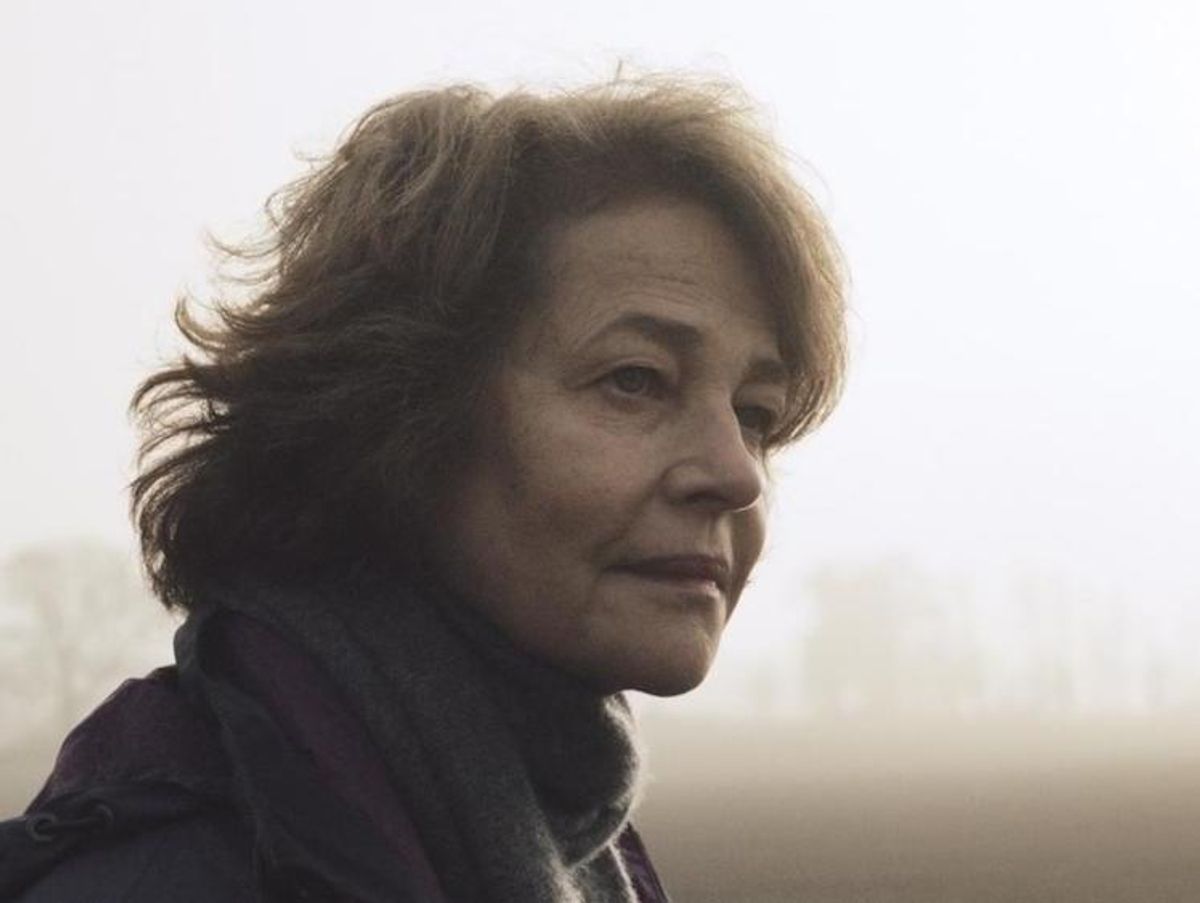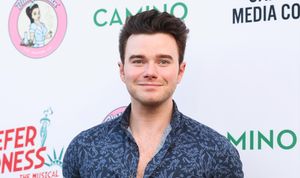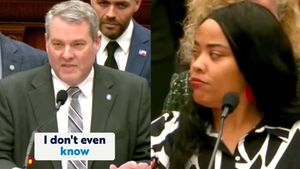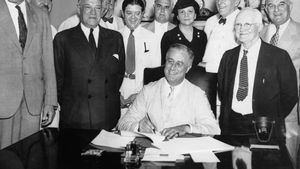Charlotte Rampling has always been an arresting presence in films -- from her swinging flatmate in Georgy Girl (1966) to her concentration camp survivor in The Night Porter (1974) -- but it was in the aughts that she started showing even more complex textures.
Flourishing under director Francois Ozon, Rampling lent enigmatic gravitas to psychological dramas like Under The Sand (2001) and Swimming Pool (2003), helping elevate them to arthouse-plus status. And now, the British actress really hits her stride in 45 Years(opening in theaters on December 23), in which she plays a woman whose longtime marriage is rocked by revelations about the husband's old girlfriend. Directed by Andrew Haigh (Weekend, Looking) the superb film has Geoff (Rampling's 1960s film peer Tom Courtenay) receiving a letter saying the body of his half-a-century-ago love has been found, which stirs up all kinds of revelations, arousals, suspicions, and resentments in his marriage. Courtenay is tops, and as the wife, Rampling masterfully mines all the changes with subtle grace as she wonders, "I can hardly be mad at something that happened before 'we' existed, can I?"
"There's something so strong and intelligent about her," Haigh said about Rampling at a recent MoMA screening of the film. "Her face is incredible to me. She's unknowable." But we know this about the film: Haigh revealed that after doing Weekend--his 2011 flick about a British gay couple's connection in the night--he was flooded with similar scripts, but he decided, "No, I want to do this film about two people in their seventies. And my agent was like, 'Really?' But weirdly, 45 Years is like a sequel to Weekend, only it's two older straight people."
The film copped Courtenay and Rampling the Berlin International Film Festival's top acting prizes, and Rampling just nabbed Best Actress from the L.A. Film Critics, the Boston Film Critics, and the European Film Awards. I spoke with the unrumpled Rampling at the Soho Grand Hotel, delving into her life and achievement.
Musto: Hello, Charlotte. Andrew Haigh said you project so much intelligence, yet are wonderfully unknowable onscreen.
Charlotte Rampling: [Smiles] When's somebody going to know something?
Your career keeps evolving. Many times people feel their lives or careers are over, but it seems like there's always another chapter, which is inspiring. Have you ever felt that way?
I've gotten to the stage where I feel I'm timeless. I feel it now. In response to what you said, our lives consist of all sorts of stages, and it's a matter of how you surf each stage until the next one. [Pause] It sounds a bit silly to say I'm timeless. Maybe I should backtrack because it would take a lot of explaining.
No, it's great -- and so true. Do you feel your roles have gotten richer through the years, or that you've matured as an actress?
I'm probably bringing extra stuff to it, but I'm not necessarily doing it any better. There are more layers perhaps now. But sometimes we don't need to show them. Acting, to me, is a state of being somebody attached to the idea of being somebody else, but it's yourself.
You seem like one of the few famous actors who don't seek the spotlight.
There must be others.
Not that I've met. Does acting provide a release for you?
I think I play parts of myself, so it's not a release. I actually connect to my characters. Maybe I've got an inflated sense of ego, that I can wear all these hats.
Would you call it method acting?
It's my method acting.
You and Tom Courtenay come off like such a cozy acting couple.
That's what we do. We knew we had to be very comfortable with each other -- immediately.
Why would such old revelations have such a dramatic effect on your character?
It becomes much more than that. It's a vast pit of questioning, "What was your relationship? What does anything mean?" It's horrible--I can't even talk about it, I get so upset. People say, "It's nothing," but I know what she's going through. Once it's detonated, something erupts inside you and is released.
But your characters have such a seemingly caring relationship -- lots of "Are you all right?" and other comments like that.
In a relationship, when you don't ask too many questions, you keep things as is because it's going OK and nothing's wrong. And then something comes in and knocks on the door. The postman rings twice here.
In one scene, you're looking at old slides and the audience gasped, but I wasn't sure what they were seeing.
[She tells me the revelation, which I'll keep secret here.] It's done with subtlety. "Have I seen it?"
That's how Haigh avoided melodrama. Very clever. Have you ever done a role simply for money?
I did once, and I can't say what that film is because the producer never let me forget it. [laughs]
For a while, ages ago, you starred in movies that seemed to fetishize the horror of the Holocaust.
Zardoz?
No, I'm referring to The Damned and The Night Porter.
We're still making films about the Holocaust. We will always make films about [historic horrors] like the Holocaust. There's a film by a new filmmaker, Son of Saul.
Do you have a lot of gay fans?
I think so.
What's your favorite type of fan -- one who leaves you alone or one who says something specific about your work?
Some of them write me a lot, actually. I'm not on social media, but some have corresponded with me. I like to have a select few people that follow you.
And aren't psychotic.
And aren't psychotic. Well, not yet. [laughs]
Do you consider yourself a gay activist or human rights activist in any way?
I follow that, but I don't think I'd actually say things. I'm not a public speaking person. My public speaking goes to interviews and that's it, or I'll relate other people's texts. But I don't go into tirades in my own words. But of course I feel in my heart very strongly about things.

A CHAT WITH MARION COTILLARD ABOUT THE BARD
Days after that interview, I lucked out and got to hang with another classic European actress: Oscar winner Marion Cotillard. The darkly effective new film of Macbeth has Cotillard as the brutally ambitious Lady M urging troubled Thane Michael Fassbender to murder and mayhem as her eyes flare. At a perfectly polite Tavern on the Green luncheon for the film, the charismatic Cotillard told me she saw a fellow acting student work on the character's final soliloquy years ago and thought, "One day, I will play this role." Of course she assumed it would be onstage, and in French. So years later, when her agent called to say there was an offer for an English-speaking film, "I said, 'Are they out of their minds?' There are 10 actresses who will have less work." Hardly--Cotillard's English has become flawless and she imbues the part with sultry hauteur.
"I think she wants to escape pain and fear," she told me about the immortal character, "and she thinks the only way is by violence and power, which is not a good option, I don't think." Hey, it works for me.
Marion likes her Macbeth director Justin Kurzel so much that she's working with him (and Fassbender) again on a movie called Assassin's Creed. But she said there's one director she didn't care for because, as they shot in the Moroccan desert, he kept smoking pot, scratching himself and yawning, and forgetting what they'd done and what needed to be done. A little google search will help you find the name of the movie and director. Again, worked for me!

Rachel McAdams, Michael Keaton, and Mark Ruffalo in 'Spotlight'
A 'SPOTLIGHT' ON DARK DOINGS IN THE CHURCH
Spotlight -- about the real-life trio of Boston columnists who uncovered pedophilia scandals in the church -- is an Oscar frontrunner that boasts an air-tight ensemble of familiar actors playing their best game. Last night at Circo, various Broadway notables gathered to honor costar Brian d'Arcy James (currently in Something Rotten) and director Tom McCarthy for their work. D'Arcy James told me that Matt Carroll, the columnist he plays, was very happy with the movie, and that Sacha Pfeiffer (the columnist played by Rachel McAdams) was originally quoted as saying that nothing good could come out of this project, but having seen the film, has radically altered her opinion to a rave.
McCarthy told me he likes hiring theater actors because "What you know you're getting is not only a solid actor, but a certain approach to the work. Actors who like to dig in together and like the rehearsal process. Not every director wants that. Some don't like it, and that's fine. But I like actors to insert themselves into the process." He said Paul Giamatti (who was in McCarthy's Win Win in 2011) is an exception -- an actor who will simply say everything's fine and dive right in, though it turns out great, so who cares?
I had a stimulating time also chatting with one of the event's cohosts, Bobby Cannavale (who's worked with McCarthy and is starring in HBO's imminent Vinyl show about the music biz in the 1970s, not to mention expecting a baby son in six weeks with Rose Byrne). Cannavale told me "It's amazing that the fact -- priests fuck little boys -- has never been addressed before in a movie. It's been quiet in popular culture. People are not as loud as they should be about this." So true -- partly because the institution used its clout to try and suppress the truth for so long, simply transferring the offending priests around while refusing to acknowledge the problem.
Cannavale is well aware that there are a lot of great priests, mind you. In fact, when he was 12, he wanted to be a priest! He told me that he was an altar boy who respected the clergymen, especially when he was bullied for being involved in church theater, "and the priests saved my life." I remarked that maybe there should be more attention paid to straight kids who are bullied, and we agreed that maybe after LGBT, they can also add an "H" so it ends with a "TH" for theater. Or maybe not, lol.

MISS CELIE'S BLUES ARE BACK ON BROADWAY
I'm definitely an LGBTH, so let's talk Broadway. I liked the musical version of Alice Walker's The Color Purple the first time around in 2005, especially when Fantasia took over the role of Celie and rocked the place to the rafters with deep-seated emotion and singing.
Well, director John Doyle has pared things down in that way he has and given it new life with a production that started at London's Menier Chocolate Factory in 2013 and comes to Broadway in very good shape. I'm not a fan of the one-set musical--in this case, a wall of planks from which wooden chairs are suspended--but Doyle also manages to spotlight the sensitivity level with effective casting and staging. The show--with an eclectic score by Brenda Russell, Allee Willis and Stephen Bray--is very heavy on the music, coming off like an American folk opera, while Marsha Norman's script adaptation is half nightmare, half wish-fulfillment, as Southern woman Celie endures all manner of oppression and abuse before standing up for herself, indulging in lesbian love, and even becoming a designer!
Did I mention lesbian love? Yes, the show makes no bones about the fact that Celie (a touching, well sung Cynthia Erivo) falls for the lusciously free spirited sexual adventuress Shug Avery--at least until Shug shrugs her off for someone male without a second's thought. The libidinal frankness is refreshing, and Oscar winner Jennifer Hudson is sensational in the role, giving Celie some much needed self-esteem and effortlessly turning the suggestive "Push da Button" into a showstopper. (Maybe one day, she can costar in the show with Fantasia, making an infallible case for the glory of American Idol.) Also memorable are the odious Mister (Isaiah Johnson), the fiery Sofia (wonderful Danielle Brooks), and a Greek chorus of three gossipy ladies who punctuate the proceedings with the vocal equivalent of raised eyebrows. By time Celie's sister (Joaquina Kalukango) resurfaces, Celie has truly found God inside herself and the audience is on its feet. Even an odd moment of fourth wall-breaking had me thinking, "Hmm. Must be an important directorial choice."

Sophia Anne Caruso & Michael C. Hall in Lazarus | Photo by Jan Versweyveld
ALADDIN INSANE
Michael C. Hall's not on his feet. When you enter the New York Theatre Workshop for Lazarus-- inspired by the novel The Man Who Fell to Earth, which David Bowie starred in the 1976 movie of -- you see Hall laying on the floor of the light brown set, with the fridge door open, and you know this isn't going to be your everyday jukebox musical. When the show (by Bowie and Enda Walsh) starts and proves to be an intermissionless hour and 55 minutes full of directorial flourishes by Ivo van Hove, your passport to adventure has been stamped as you realize that every square inch of that stage will be directed from beginning to end, and with evocative, elaborately thought out visual effects yet.
Hall plays a heartbroken alien -- the kind of person Donald Trump wouldn't care for -- who's gotten rich and has to battle earthly ickiness to try and get back to his planet, a feat a young girl (Sophia Anne Caruso) wants to help him do -- though all of the above might be a figment of his (or our) imagination. The mood is hypnotically weird (or weirdly hypnotic?), abetted by enduringly great Bowie songs ("Changes," "Heroes," "Absolute Beginners") awash in projections mirroring the character's internal lives, and played by a band in a large glass case flashed with its own projections that make them seem like a natural history display. Strobes, popped balloons, projected blood, and a videotaped Alan Cumming cameo all figure in the production, which is either brilliant or pretentious, depending on your frame of mind and your taste for variations on posing and outbursts, done without applause "buttons." I welcome the return to avant-garde chutzpah, though after some thrilling moments, I can't say the piece remained as riveting as Mr. Bowie himself has.
Van Hove's Broadway production of Arthur Miller's A View From The Bridge also happens to be an intermissionless hour and 55 minutes, and it also deals with a misunderstood alien who might be sent back. But here, van Hove's directorial choices tend to enhance the material, like surrounding the action with a Lucite railing to make it a kind of boxing ring cum sandbox, and seating audience members onstage to serve as a sort of de facto jury. Mark Strong is powerful as Eddie, a Brooklyn longshoreman who's responsible for his niece (Phoebe Fox) and becomes way too touchy and possessive about it, wanting to hold her back from getting a job and a boyfriend, all while trying to convince himself it's for her own good. Fulminating with jealous rage, he starts painting her new man -- a very earnest immigrant (Russell Tovey) as gay. ("He sings, he cooks, he makes dresses. That's why the waterfront is no place for him.") The resulting tragedy, down to a blisteringly performed same-sex kiss, is compellingly acted by all, including Nicola Walker as Eddie's wife, who only wants to make peace, but can't manage to calm Eddie's animal instincts. And the flourishes and stylizations generally work, except for the soft, ominous drumbeats and other sounds that underscore the play throughout. We get it! Something bad's gonna happen!
FREE LESBIAN TIDBIT
When I left the theater after the opening night performance of School of Rockand went outside, an attractive woman there looked at me and said, "Hello, Michael." It was Sarah Paulson, the excellent actress from Carol, 12 Years a Slave, and American Horror Story. I noticed that, while walking, she was holding onto her reported girlfriend, Holland Taylor (another excellent actress and a recent survivor of Charlie Sheen). I got a thrill because I love when fab gossip headlines become my actual life, or vice versa. Congrats to these two.





























































































